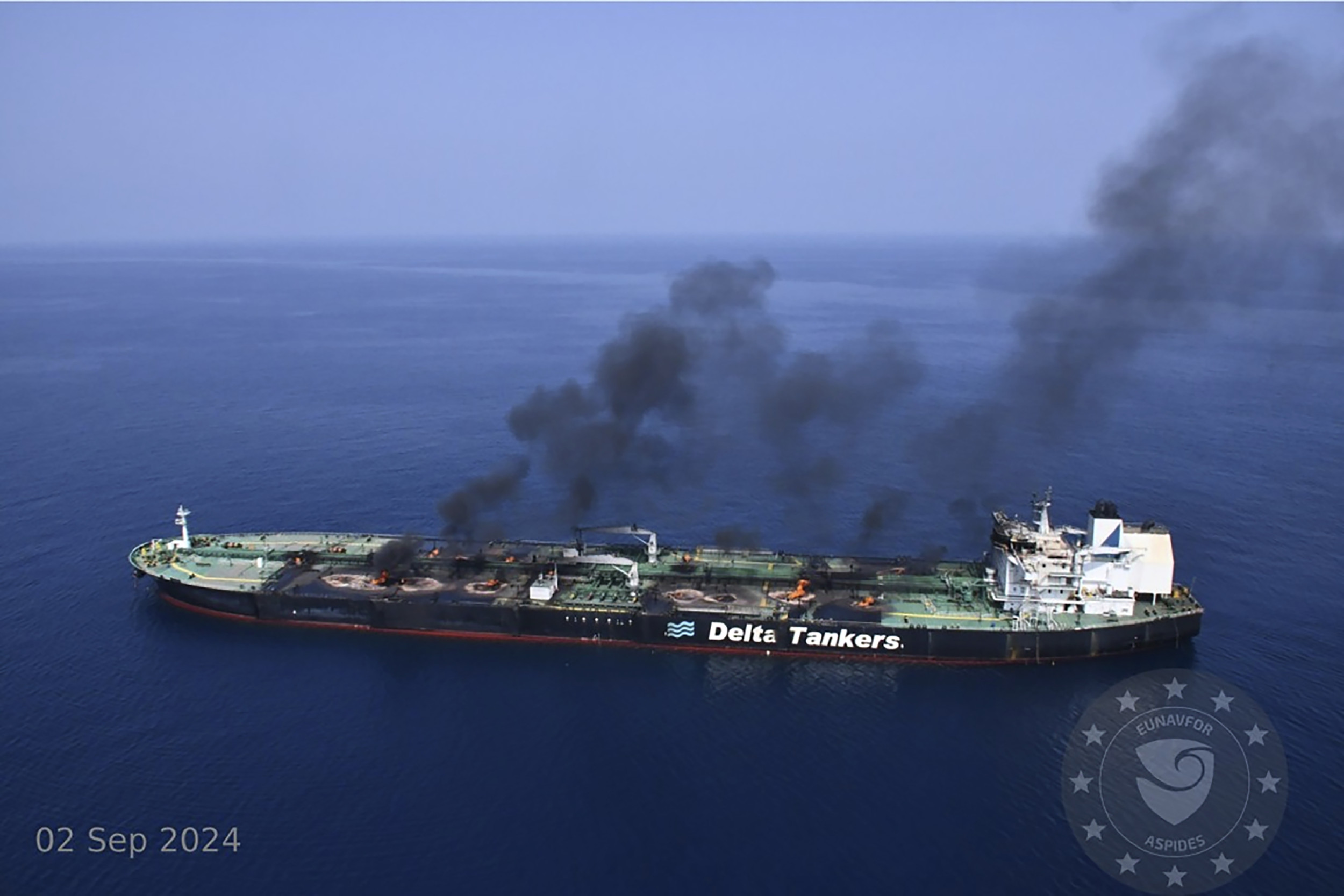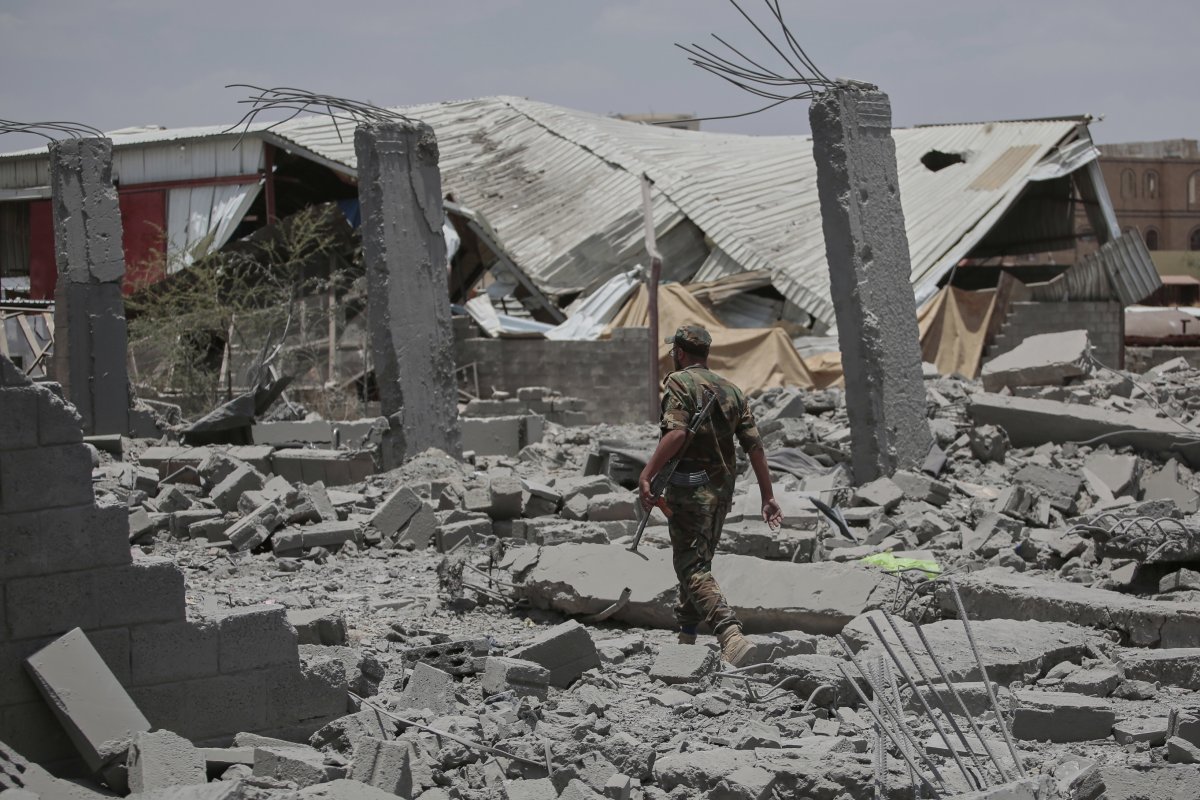
The Yemeni Houthis have shown growing defiance toward the U.S., despite more than nine weeks of airstrikes aimed at deterring attacks in the Red Sea and on Israel, escalating tensions with Iran over its support for the group.
Newsweek has reached out to the Pentagon, Houthi officials, as well as the Israel Defense Force and Iran’s foreign ministry for comment.
Why It Matters
The Houthi’s escalating and damaging attacks mark a significant shift in the Middle East conflict. President Donald Trump has vowed to annihilate the militant group and the prolonged campaign has prompted additional U.S. military deployments.

European Union’s Operation Aspides/AP
What To Know
Since October 7, 2023, Houthi attacks on Red Sea shipping and strikes on Israel have been a key part of the Iran-supported armed groups’ response to the Gaza war. In 2025, the U.S. ramped up pressure through intensified airstrikes and renewed sanctions to cut off their financial and arms supply networks.
Over a month into the campaign, the U.S. military claimed it had destroyed hundreds of Houthi targets and eliminated key commanders, while the Houthis said they had downed multiple MQ-9 Reaper drones and caused the loss of a fighter jet, which the U.S. says fell overboard from the USS Harry S. Truman aircraft carrier.
On Sunday, a ballistic missile launched by the Houthis struck near Ben Gurion International Airport, evading interception by the Arrow 3 and U.S. THAAD systems—an unusual breach that raised questions about evolving Houthi missile technology. The Israeli military said it launched an investigation.
“They’re experts on missiles. I mean they actually make missiles, nobody thought that, but they make missiles,” Trump said during an Oval Office press conference with Israeli Prime Minister Benjamin Netanyahu in April.
Experts have cautioned since the early days of the strikes ordered on March 15 are unlikely to counter entrenched power in guerrilla warfare and territorial control.
“Washington must avoid acting in Yemen without at least coordinating with its regional allies in the Gulf, specifically the UAE and Saudi Arabia,” Research Fellow Farea al-Muslimi and Associate Fellow Thomas Juneau at Chatham House Middle East and North Africa Program noted in an analysis published in April.
But direct involvement may be elusive, as both Saudi Arabia and the United Arab Emirates are reluctant to reengage militarily in Yemen after years of costly involvement that failed to defeat the Houthis. “However, both the Saudis and Emiratis have a vested interest in how the war ends and may provide more covert support to forces on the ground”, Emily Milliken, Associate Director at the Atlantic Council’s Middle East Programs told Newsweek.
On Tuesday, the United Kingdom joined the United States in a coordinated military operation targeting Houthi positions, part of ongoing efforts to secure Red Sea shipping lanes. But Egypt’s President Abdel Fattah el-Sisi pushed back against Trump’s request to support the U.S. operations, according to The Wall Street Journal, despite losses in the Suez Canal‘s revenues as a result of the maritime disruption.
Meanwhile, the Houthis, who have been losing hundreds of fighters, have continued to mobilize against the U.S. and Israel, while Iran has dismissed accusations of supporting the group and warned both countries against threats towards its territory.

Osamah Abdulrahman/AP Photo
What People Are Saying
Israel’s Prime Minister Benjamin Netanyahu’s office on X: “President Trump is absolutely right! Attacks by the Houthis emanate from Iran. Israel will respond to the Houthi attack against our main airport AND, at a time and place of our choosing, to their Iranian terror masters.”
Emily Milliken, Associate Director of Media and Communications for the N7 Initiative at the Atlantic Council’s Middle East Programs told Newsweek: “The Houthis’ desire to strike Israel in such an important site for tourism underscores the group remains undeterred by the US air strike campaign. As long as the group’s senior leadership remains intact, we can expect them to continue strikes targeting Israeli territory and maritime traffic in retaliation to US strikes and to showcase they are undeterred.”
What Happens Next
The escalation is raising regional stakes, with rival Yemeni forces preparing ground offensives and increasing concerns of a potential Iran-Israel confrontation, as the U.S. intensifies its military involvement in the region.





